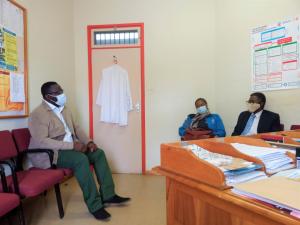His mother succumbed to Coronavirus
Inarguably, grief over a Coronavirus (COVID-19) death is drastic and deep-rooted. Moses’s mother was an everyday figure in his life – a confidant and a mentor. In this sense, when she passed away from COVID-19 in August 2020 at Walvis Bay, Moses grappled with the grief. Now he hopes his episode will be a lesson to others: Steer clear of complacency amid the pandemic.
Sundown is still the lowest for Moses. There are moments at night when he reaches for his mobile to call his mother, upon knowing fresh breaking news as reported by the media – a chance for him to emit over the latest current affairs which have manifested the day. However, reality then hits in. Simply put, the call goes unmade, let alone his mother’s mobile being answered.
Moses says: “While I have accepted that mommy has gone home, it is a difficult thing to do. She was so much a part of my daily life. Nevertheless, I tend to find healing when I visit her grave”.
Moses’s mother, previously a nurse by profession, is one of the over two-hundred who have died from COVID-19 so far in Namibia. The pandemic has shaken all corners of the country - it has taken, disrupted and changed human-being lives. In recent months, fears of complacency have settled in as more dialogue is created around physical distancing, the need for masks, and adequate testing. Moses has observed all of this transpire in skepticism – his mother’s departure, due to COVID-19, had become the worst kind of object lesson conceivable.
Moses explains: “Mommy always gave me positive reinforcement about who I was and, to make a meaningful contribution to society. In other words, she taught me to have an opinion and to speak out. In this context, I speak out when there is need”.
There is a need now. Moses shares the story of his mother’s loss with the intent of wanting everyone to know about COVID-19 - it can happen to anyone. His mother’s death has left a hole in his life. More than ever before, the stakes are high and, vigilance with the virus must remain towered. Precautions, such as wearing of masks correctly and staying 1.5 metres apart, must be adhered to, with the aim of preventing other Namibians from Moses’s encounter.
On the same wavelength, Dr Charles Sagoe-Moses, WHO Representative to Namibia says:
“As the COVID-19 pandemic continues to evolve, WHO along with the Ministry of Health and Social Services (MoHSS) are committed to doing everything possible in order to keep the Namibian society safe. In like manner, this partnership (WHO and MoHSS), is also devoted to the continuous supply of medicines for the patients who need them”.
Death of family and friends is an agonising experience and, adding COVID-19 to the cause of death is naturally to be more painful for several reasons - families are separated from their hospitalised loved one due to potential contagion. Yet, research from WHO shows that most people can recover from the loss, through a passage of time, if they have healthy habits and social support.
Moses adds: “There is no right or wrong way to grieve, but there are vigorous ways to deal with the grieving process. As we move through the pain of grief, it is important to remember to identify new strengths, along with capabilities, and develop long-standing relations with others”.



